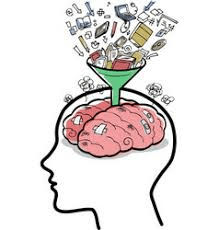If you feel like a mindset novice, before reading this article, you might find value in reading this article: What are Mindsets & Why are They Foundational to Our Success? It lays the groundwork for why I am focusing on and summarizing the benefits of an open mindset.
Closed and Open Mindsets
We possess an open mindset when we are open to the ideas and suggestions of others, and we are willing to take them seriously.
We possess a closed mindset when we are closed to the ideas and suggestions of others.
Intuitively, these mindsets stem from a belief about our level of perceived knowledge on a given topic.
If we compare our mind to a bucket, someone with a closed mindset believes that what they know is best, and thus, they believe that their bucket is full. Being full, their bucket (i.e., their mind) is unable to take in any additional information.

When we believe that our bucket is full, and we have a closed mindset, our primary desire is to be seen as right. We want to have our ideas supported and we want to be the one providing the answers, and we simultaneously become closed to the perspectives and ideas of others.
Often, we get into a closed mindset because we are in implementation mode,” when we are focused on taking a project to completion.
But, when we leave room in our bucket, we believe that our knowledge or expertise does not capture everything there is to know and we are open to the idea that we can be wrong. When we are open to the idea that we can be wrong, we are primarily concerned about finding truth and thinking optimally (not being seen as right). With this open-mindset desire to find truth and think optimally, we ask questions, invite feedback, and invite new perspectives to ensure we see and think as optimally as possible.

Even when “implementing,” those with an open mindset allow space for new ideas to at least be presented and considered.
Research Benefits of Possessing a Growth Mindset
Fortunately, we have 30+ years of academic research on closed and open mindsets that have been able to clearly demonstrate the effect these mindsets have on how we operate. This research has repeatedly demonstrated that those that have an open mindset think and process much more effectively than those with a closed mindset in two primary ways.
First, an open mindset positively influences how we interpret situational cues.
|
Those with a Closed Mindset: | Those with an Open Mindset: |
|
Think they are right and want to be viewed as being right |
Want to make appropriate decisions and think optimally |
|
Sensitive to cues that indicate their perspective is correct |
Sensitive to cues that indicate opportunities for improved thinking |
| Primed to explore how, when, and where to do something |
Primed to explore why one should do something and related pros and cons |
Second, an open mindset activates specific processing dynamics to navigate our situations in a manner aligned with our interpretation of situational cues.
|
Those with a Closed Mindset: | Those with an Open Mindset: |
|
Less impartial, more biased, and less accurate in processing and decision making | More impartial, less biased, and more accurate in processing and decision making |
| Less open to new information |
More open to new information |
| Less inclined to spot relevant information and engages in more selective filtering |
More inclined to spot relevant information and engages in less selective filtering |
Overall, 30+ years of research on closed and open mindsets demonstrates that those with an open mindset are much more inclined to think and process more optimally, allowing them to operate more effectively.
Want to learn the degree to which you have an open mindset relative to 10,000+ people who have taken my FREE personal mindset assessment?
In my next article, will be focusing on how we develop more of an open mindset to capture more of these benefits in our lives.
Also, if you want to dive deeper into the topic, read my most read article of 2019: Do You Have a Closed or an Open Mindset?










